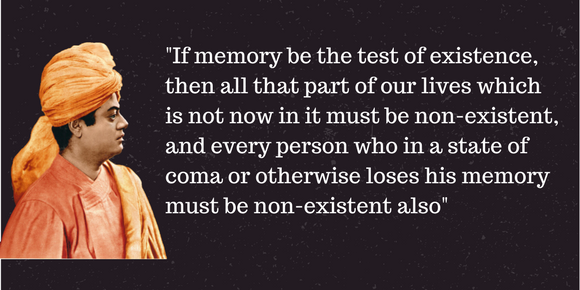The powers of the mind are like rays of light dissipated; when they are concentrated, they illumine. This is our only means of knowledge. (I.129)
The man that has practiced control over himself cannot be acted upon by anything outside; there is no more slavery for him. His mind has become free. Such a man alone is fit to live well in the world.
The mind uncontrolled and unguided will drag us down, down for ever – rend us, kill us; and the mind controlled and guided will save us, free us. (VI.30-32)
We are what our thoughts have made us; so take care of what you think. Words are secondary. Thoughts live, they travel far. Each thought we think is tinged with our own character, so that for the pure and holy man, even his jests or abuse will have the twist of his own love and purity and do good. (VII.14)
Whatever you do, devote your whole mind, heart, and soul to it. I once met a great sannyasin, who cleansed his brass cooking utensils, making them shine like gold, with as much care and attention as he bestowed on his worship and meditation.
All knowledge that the world has ever received comes from the mind; the infinite library of the universe is in your own mind. The external world is simply the suggestion, the occasion, which sets you to study your own mind, but the object of your study is always your own mind. The falling of an apple gave the suggestion to Newton, and he studied his own mind; he re-arranged all the previous links of thought in his mind and discovered a new link among them, which we call the law of gravitation. It was not in the apple nor in anything in the centre of the earth. (I.28)
Good and evil thoughts are each a potent power, and they fill the universe. As vibration continues, so thought remains in the form of thought until translated into action. For example, force is latent in the man’s arm until he strikes a blow, when he translates it into activity. We are the heirs of good and evil thought. If we make ourselves pure and the instruments of good thoughts, these will enter us. The good soul will not be receptive to evil thoughts. (VI.134)
As a lamp kept in a windless place does not flicker, such is the state of the yogi whose mind is under control and who is engaged in concentration on the self.
Concentration of the powers of the mind is our only instrument to help us see God. If you know one soul (your own), you know all souls, past, present, and to come. The will concentrates the mind, certain things excite and control this will, such as reason, love, devotion, breathing. The concentrated mind is a lamp that shows us every corner of the soul. (VII.59-60)
It is thought which is the propelling force in us. Fill the mind with the highest thoughts, hear them day after day, think them month after month. Never mind failures; they are quite natural, they are the beauty of life, these failures. What would life be without them? It would not be worth having if it were not for struggles. Where would be the poetry of life? Never mind the struggles, the mistakes. (II.152)
The man who has control over his own mind assuredly will have control over every other mind. That is why purity and morality have been always the object of religion; a pure, moral man has control of himself. He who knows and controls his own mind knows the secret of every mind and has power over every mind. (II.17)
Ninety percent of thought-force is wasted by the ordinary human being, and therefore he is constantly committing blunders, the trained man or mind never makes a mistake. (VI.123-124)
To control the mind you must go deep down into the subconscious mind, classify and arrange in order all the different impressions, thoughts, etc. stored up there, and control them. This is the first step. By the control of subconscious mind you get control over the conscious.
If the mind is not under control, it is no use living in a cave because the same mind will bring all disturbances there. If the mind is under control, we can have the cave anywhere, where ever we are. (I.440-441)




Leave A Comment